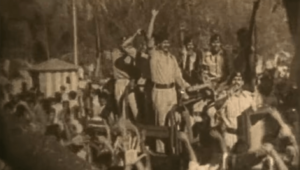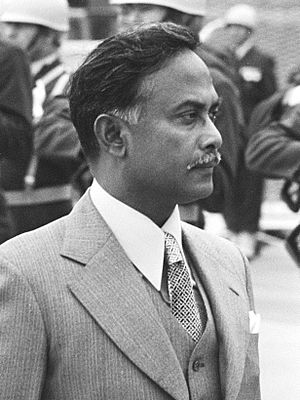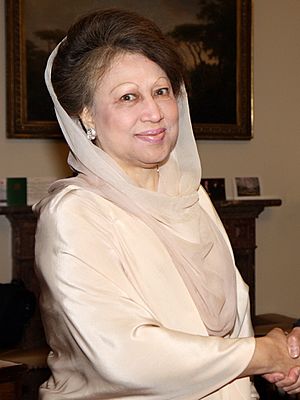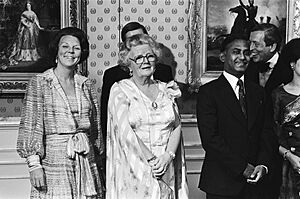Bangladesh Nationalist Party facts for kids
Quick facts for kids
Bangladesh Nationalist Party
বাংলাদেশ জাতীয়তাবাদী দল
|
|
|---|---|
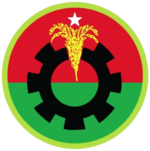 |
|
| Abbreviation | BNP Nationalist Party |
| Chairperson | Khaleda Zia Tarique Rahman (acting) |
| General Secretary | Mirza Fakhrul Islam Alamgir |
| Standing Committee | National Standing Committee |
| Spokesperson | Ruhul Kabir Rizvi |
| Founder | Ziaur Rahman |
| Founded | 1 September 1978 |
| Preceded by | Jatiyatabadi Ganatantrik Dal |
| Headquarters | 28/1, Naya Paltan, VIP Road, Dhaka |
| Newspaper |
|
| Student wing | Bangladesh Jatiotabadi Chatradal |
| Youth wing | Bangladesh Jatiotabadi Jubodal |
| Women's wing | Bangladesh Jatiotabadi Mohila Dal |
| Trade union | Bangladesh Jatiotabadi Sramik Dal |
| Farmer wing | Bangladesh Jatiotabadi Krishak Dal |
| Volunteer wing | Bangladesh Jatiotabadi Swechhasebak Dal |
| Clergy wing | Bangladesh Jatiotabadi Ulama Dal |
| Ideology | Liberalism (Bangladeshi) Conservatism (Bangladeshi) Economic liberalism |
| Political position | Centre to centre-right |
| National affiliation | None Former:
Jatiyatabadi Front (1978)
7 Party Alliance (1983–1999) 4 Party Alliance (1999–2012) 20 Party Alliance (2012–2022) Jatiya Oikya Front (2018–2022) |
| International affiliation | Centrist Democrat International |
| Colors | Red Green (national colours) Sky blue (customary) |
| Slogan |
|
| Anthem |
|
| MPs in the Jatiya Sangsad | Parliament dissolved |
| Mayors in the City Corporations |
1 / 1
|
| Councillors in the City Corporations | Post dissolved |
| Chairman’s in the District councils | Post dissolved |
| Chairman’s in the Subdistrict Councils | Post dissolved |
| Chairman’s in the Union councils | Post dissolved |
| Election symbol | |
| Party flag | |
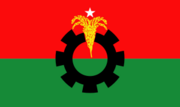 |
|
The Bangladesh Nationalist Party (BNP) is a big political party in Bangladesh. It was started on September 1, 1978, by President Ziaur Rahman. He wanted to bring people together with a strong sense of national identity. The BNP later became one of the two main political parties in Bangladesh, often competing with the Awami League.
The BNP was formed after Ziaur Rahman won the presidential election in 1978. He led the party until he passed away in 1981. After his passing, his wife, Khaleda Zia, became the party's leader. She was the chairperson until 2018. Since then, Tarique Rahman, their son, has been the acting chairperson, managing the party from London.
Since it began, the BNP has won several elections. These include the 1979 and 1981 presidential elections. They also won general elections in 1991, February 1996, and 2001. Khaleda Zia became the prime minister of Bangladesh. She was the first woman prime minister of Bangladesh. The party also holds the record for being the largest opposition party in the country's history, with 116 seats in the June 1996 election.
Currently, Begum Khaleda Zia is the party's chairperson. Tarique Rahman is the acting chairman, and Mirza Fakhrul Islam Alamgir is the secretary-general. The party focuses on Bangladesh's full independence. It also blends Bengali and Islamic traditions. The BNP is often seen as being open to global connections. It aims to attract foreign investment and money sent home by people working abroad.
The party has faced some challenges. These include concerns about how it managed the country, especially from 2001 to 2006.
Contents
- History
- How the Party Started
- Forming the BNP
- Early Years (1979–1982)
- Fighting for Democracy (1982–1990)
- 1990 Mass Uprising
- 1991 General Election and First Khaleda Ministry
- February 1996 General Election and Second Khaleda Ministry
- June 1996 General Election and Opposition Party
- 2001 General Election and Third Khaleda Ministry
- Political Challenges (2006–2008)
- Opposing the Awami League (2009–2024)
- 2014 General Election
- Student–People's Uprising
- After the Revolution (2024–present)
- Ideology
- Policies
- National Standing Committee
- Election Results
- See also
History
How the Party Started
JaGoDal
Before the BNP, a party called Jatiyatabadi Ganatantrik Dal (JaGoDal) was formed on February 22, 1978. Justice Abdus Sattar helped organize it. Many important people who were advising the country at that time joined JaGoDal. This party was the first step to create a group for people who believed in nationalism in Bangladesh. JaGoDal later joined another group called the Jatiyatabadi Front.
Jatiyatabadi Front
On May 1, 1978, the Jatiyatabadi Front, or Nationalist Front, was created. Ziaur Rahman was its main leader. JaGoDal joined this front. A big part of another party, NAP (Bhashani), also joined. The election symbol of NAP (Bhashani), a sheaf of paddy, later became the symbol of the BNP. Other groups and leaders also joined the front.
Ziaur Rahman was the front's candidate for the presidential election on June 3, 1978. He won the election, defeating M. A. G. Osmani.
Forming the BNP
After Ziaur Rahman won the presidential election in 1978, the Bangladesh Nationalist Party (BNP) was officially started on September 1. The new party quickly became a mix of different political ideas. People from various backgrounds, including those from left-leaning and right-leaning groups, joined.
The party's rules were written within 21 days. Ziaur Rahman was the main organizer. Many supporters and activists joined the new student and youth groups of the party. After the government was formed, the first main committee of the party was announced. A special committee, called the National Standing Committee, was also created. This committee was the highest decision-making group for the party.
A youth group, Bangladesh Jatiyatabadi Jubo Dal, was formed in September 1978.
Early Years (1979–1982)
The BNP formed its first government after winning the 1979 general election in Bangladesh. The parliament's first meeting was on April 2, 1979. Shah Azizur Rahman was chosen as the prime minister. Mirza Ghulam Hafiz became the speaker of the parliament.
On May 30, 1981, President Ziaur Rahman, the party's founder, passed away. Large crowds protested in cities like Dhaka and Chittagong. His funeral was a very large event, with millions of people attending in Dhaka.
In the 1981 presidential election, Abdus Sattar was elected president.
Fighting for Democracy (1982–1990)
1983 Coup d'état
On March 24, 1982, Army Chief Hussain Muhammad Ershad took over the elected government of Justice Sattar. The BNP was removed from power. Many of its leaders were put in prison.
7-Party Alliance
From 1983, Begum Khaleda Zia became the main decision-maker for the party. Under her leadership, the BNP formed a new group to oppose the government led by Ershad. This group was called the 7-Party Alliance because it had seven parties.
The BNP started a big movement against the government in September 1983. They worked with another group, the 15-Party Alliance. The 7-Party Alliance organized a large meeting and called for a nationwide strike on November 1, 1983. The strike was successful. After that, the alliance asked people to gather around the Secretariat building on November 28, 1983. Thousands of BNP supporters gathered. The police responded, and some leaders were arrested. The government then stopped political activities and put Begum Khaleda Zia under house arrest.
On February 29, 1984, Ershad announced that political activities would be allowed again on March 26. He also said that elections would be held in May. The 7-Party Alliance wanted the national election to happen before the presidential election. After the ban was lifted, Khaleda Zia became the acting chairperson of the party on April 1. In May, Justice Sattar resigned, and Khaleda Zia became the official chairperson of the party.
Under Khaleda Zia's leadership, the BNP made some important changes. They removed some leaders from the party who later formed their own groups.
Attack on Begum Khaleda Zia
On September 23, 1984, while Khaleda Zia was speaking at a rally in Bogra, some small explosive devices were thrown. Some were aimed at the stage where she was speaking. Khaleda Zia was not hurt, but several party members were injured. A nationwide strike was called to protest this attack.
1985 Local Elections
The government held local elections in May 1985. The BNP faced challenges because of government actions. However, 46 of its leaders won positions as local chairmen.
Student Alliance
In 1985, the BNP's student group, Bangladesh Jatiotabadi Chatra Dal, formed an alliance with other student organizations. They began to protest against Ershad's government.
1986 General Election
In March 1986, Ershad announced that a national election would be held on April 26. Both the BNP-led 7-Party Alliance and the Awami League-led 15-Party Alliance decided not to take part in the election. They called for a joint rally and a nationwide strike to stop the election.
However, the night before the strike, the Awami League decided to participate in the election. Five parties left the Awami League's alliance because of this. The BNP and its allies continued to campaign against the election.
The election was largely boycotted by many parties. The BNP chairperson encouraged many political parties to boycott the election. Khaleda Zia said the BNP would only join if basic rights were returned, political prisoners were freed, and military court decisions against politicians were canceled.
The anti-election groups called for a nationwide strike on election day. There were reports of problems during the election. Both the Awami League and Bangladesh Jamaat-e-Islami did not perform well in this election.
General Hussain Muhammad Ershad was elected president on October 15, 1986. Before this election, Khaleda Zia was put under house arrest on October 13.
In November 1987, the two alliances called for a "Siege Dhaka" program. The government banned public gatherings, but people ignored it. The capital city was largely controlled by the opposition groups that day. This made the opposition very angry, and they called for more protests. Both Khaleda Zia and Sheikh Hasina were put under house arrest on October 11. Both parties and their partners called for frequent nationwide strikes until the end of the year.
1988 General Election
The BNP decided not to join the 1988 general election under Ershad's government. They called for a nationwide strike on election day and said they would resist the election.
Party Changes
On June 21, 1988, Begum Zia made some changes to the party's leadership. She removed some former military officers from important positions. On July 3, 1988, Barrister Abdus Salam Talukder became the new Secretary General of the party. He helped reorganize the BNP, making it stronger during a difficult time. This helped the party work towards removing Ershad's government.
1990 Mass Uprising
The movement against Ershad grew stronger in October 1990. The BNP-led 7-party alliance, the Awami League-led 8-party alliance, and a leftist 5-party alliance started a movement to remove Ershad. They called for a nationwide strike on October 10, 1990. This strike led to some deaths, including BNP activists.
On November 28, the opposition parties, including the BNP, ignored the curfew and state of emergency. They came out with large protests. By the end of November 1990, the curfew and emergency rules were no longer effective. On December 3, the protests became more intense. Many people died. On December 4, a large uprising happened, and Ershad announced he would resign.
The Dhaka University Central Students' Union (DUCSU) played a key role in this movement. The student group linked to BNP, Bangladesh Jatiotabadi Chatra Dal, took control of DUCSU after an election in June 1990. They led the student movement on the University of Dhaka campus.
The DUCSU committee, led by Chatra Dal, joined with other student groups. They held a demonstration on October 1, 1990. The protests became violent after police fired on a Chatra Dal rally on October 10. This led to the death of Naziruddin Jehad, a Chatra Dal leader.
These student protests made Ershad's government consider leaving power.
Teachers at Dhaka University also played a role. The pro-BNP teachers, who were strong in the Dhaka University Teachers Association, started a big movement against Ershad in 1990. All the teachers decided to resign from their jobs on November 29. They said they would not return to classes until Ershad's government fell. This strong action from the teachers put more pressure on Ershad.
After Ershad's government fell, the pro-BNP teachers won a big victory in the Dhaka University Teachers Association election on December 24, 1990.
1991 General Election and First Khaleda Ministry
The BNP won the 1991 general election. Khaleda Zia became the prime minister for the first time.
February 1996 General Election and Second Khaleda Ministry
The BNP won the February 1996 general election. Khaleda Zia became prime minister again.
June 1996 General Election and Opposition Party
In the June 1996 general election, the BNP became the main opposition party.
2001 General Election and Third Khaleda Ministry
The BNP won the 2001 general election. Khaleda Zia became prime minister for her third term.
Political Challenges (2006–2008)
A government supported by the military took power in 2006. It aimed to address issues like corruption. Many politicians, including Khaleda Zia and her sons, faced charges.
The Bangladesh Election Commission initially recognized a different group as the legitimate BNP. Khaleda Zia challenged this in court, but her appeal was rejected. After she was released later that year, Zia was back as the party leader.
2008 General Election
In the 2008 Bangladesh general election, the BNP and its allies won 33 seats out of 299. The BNP alone won 30 seats.
Opposing the Awami League (2009–2024)
5th National Council, 2009
The BNP held its 5th National Council in 2009. This event allowed local leaders to be more involved in the national party. Khaleda Zia was re-elected as chairperson. Her eldest son, Tarique Rahman, was elected as Senior Vice-Chairman. This was seen as a step to prepare him for leading the party in the future.
2014 General Election
Between 2012 and 2014, there was a lot of political unrest. The BNP and its allies tried to stop the 10th general election in January 2014. They wanted a neutral caretaker government to oversee the election. Khaleda Zia led the BNP in boycotting the election. There were reports of violence on election day.
In 2016, the BNP announced its new National Standing Committee. Khaleda Zia remained chairperson. New members joined, and some older members left. The party also developed new plans for how it would operate. In May 2017, Khaleda Zia shared BNP's "Vision 2030." This plan aimed to gain public support for future elections. However, the ruling Awami League government said that Vision 2030 was similar to their own "Vision 2021." The BNP also announced protests to demand that the next general elections be held under a neutral government. This increased tensions between the BNP and the Awami League.
Khaleda Zia's Imprisonment
On February 8, 2018, Khaleda Zia and her son Tarique Rahman were sentenced to jail. This was due to a court case. Tarique was already living outside the country. Khaleda was imprisoned in the old Dhaka Central Jail. In response, the BNP held protests across the country. However, the police were prepared and stopped many of these demonstrations. Many BNP activists were arrested during clashes with the police.
In October 2018, the Bangladesh government formed a group to find and monitor rumors on social media. This group aimed to ensure people received correct information. Later, about 30 social media accounts linked to spreading false news about the BNP were blocked.
2018 General Election
After Khaleda Zia was jailed, the BNP worked to form a national alliance with other important leaders. In October 2018, the party officially joined the Jatiya Oikya Front. Dr. Kamal Hossain was a key leader of this front.
There was some discussion before the elections about candidates from the Jamaat-e-Islami party running under the BNP's name. In 2013, the Jamaat-e-Islami was not allowed to register for elections. However, 25 Jamaat candidates ran in the election, mostly with BNP support. An investigation was started, but the Election Commission said they could not reject the candidates at that time. Just before the election, Kamal Hossain said he regretted Jamaat's involvement.
2024 General Election
On March 26, 2020, Khaleda Zia's jail sentence was temporarily stopped for six months because of the COVID-19 pandemic. She was allowed to be released on certain conditions, including getting medical treatment in Bangladesh and not traveling abroad. This temporary release has been extended several times. Since her release, the BNP has asked for her full release and permission for her to travel abroad.
To prepare for the 2024 general election, the BNP held many rallies. They called for Prime Minister Sheikh Hasina to resign. They also wanted the return of a caretaker government to oversee elections. During a rally in Dhaka on December 10, 2022, seven BNP lawmakers announced they were resigning from the current government. They demanded that the parliament be dissolved and a new election commission be formed. They also wanted the election to be held under a neutral caretaker government.
Student–People's Uprising
The BNP actively supported the 2024 Bangladesh quota reform movement. Later, it joined the Non-cooperation movement against the Sheikh Hasina government.
After the Revolution (2024–present)
After Sheikh Hasina's government fell, BNP chairperson Khaleda Zia was set free. After her release, she gave a speech to the nation. An interim government was formed, and the party called for a democratic election.
Ideology
The Bangladesh Nationalist Party is a broad political party. It is seen as being in the center to center-right of politics. Its ideas combine liberalism, conservatism, and economic liberalism. The party's official website states its main beliefs are "full faith and trust in Allah", Bangladeshi nationalism, democracy, and socialism (meaning economic and social fairness).
The BNP was formed when there was a gap in Bangladesh's politics. This happened after the changes in government in 1975. Many politicians from different parties joined the BNP to return to mainstream politics. Some of these politicians had different ideas. Experts say that the early BNP was a mix of different groups rather than having one clear idea. Some believe the BNP tried to gain support where the Awami League was more moderate.
According to political experts, BNP was founded as a center-left, liberal, and social democratic party. Its early policies were inspired by social liberal politics in Western Europe.
Senior BNP leader Khandaker Mosharraf Hossain said that BNP's ideas include Bangladeshi nationalism, faith in Allah, and creating a fair society. He also mentioned that BNP supported private ownership and a free market economy.
Nationalism
Bangladeshi nationalism is the main idea of the party. It comes from a 19-point plan that stated Bangladesh's independence is a sacred trust. According to its founder Ziaur Rahman, the "Bangladeshi" identity is special. It is based on the country's history, traditions, culture, and land. This identity is different from neighboring countries. Some argue that Zia wanted to move away from narrow ethnic or religious nationalism. He aimed to create an identity for citizens based on the state, similar to Western countries. The BNP's message supports a popular form of nationalism.
Economy
The party officially calls itself socialist. It claims to have practiced "people's democracy." The party's founding ideas included social and economic fairness. However, in practice, the BNP supports economic liberalism and a free-market economy. This means they believe in less government control over the economy. Ziaur Rahman thought that the previous socialist-influenced economy was not doing well. He believed a new economic system was needed. This new system was mainly a plan for a capitalist system. Early BNP policies were inspired by European social liberal ideas. These ideas supported fair distribution of wealth and social welfare. But they were against strong government control over the economy.
Religion
The BNP's view on religion has changed over time. The party's founding document says that the people of Bangladesh want "full faith and confidence in the almighty Allah, democracy, nationalism." The party does not officially call itself Islamic. However, its website states that it aims to "preserve the old human values of the Bangladeshi people through the teaching of Islam—the religion of most Bangladeshi people—and other religions." At the same time, the party also supports religious freedom and tolerance. Many of the party's founding leaders were not Muslim. Ziaur Rahman did not believe that a religious government should rule Bangladesh.
Recently, the party has sometimes seemed to show a secular approach. For example, some leaders have said that religious texts should not be used in politics. They have also promised to support the country's secular identity. In 2018, Mirza Fakhrul Islam Alamgir stated that the BNP does not believe in Shariah law. He also rejected Islamic fundamentalism. After the July Revolution in 2024, the party seemed less interested in working with its long-time political partner, Jamaat-e-Islami. They formally ended their ties in August 2024. The party has also shown signs of moving away from its traditional moderate Islamic values. They are adopting ideas that seem more aligned with secular political principles. Despite this, the BNP publicly denies being secular or supporting many different ideas.
According to political experts, the BNP is not a traditional religion-based party. It has a moderate view on religion. The BNP's support for conservatism mixes traditional Bengali customs with moderate Islam. One expert said that while the BNP was seen as conservative because of its past alliances with Islamist groups, most of its policies were not strictly Islamist. They were more center-right or center-left. However, from 2001 to 2006, the party was very closely linked with Jamaat. This made it easy to confuse the BNP's ideas with Jamaat's.
BNP joint secretary Syed Emran Saleh Prince described the party as "religion-friendly." He rejected politics based only on religion. He stated that the party believes in religious values, religious freedom, "trust and faith in Almighty Allah," and harmony among different communities. He said that after Bangladesh's independence, the Awami League promoted non-religious ideas. But President Ziaur Rahman respected the feelings of most people by adding "Bismillahir Rahmanir Rahim" and religious values. He also added "trust and faith in Almighty Allah" instead of secularism. The BNP continues to follow Zia's policy.
Supporter Base
The BNP is a big party that tries to get support from many different groups of people. However, because of its history and ideas, some groups always support the party. According to political scientist Rounaq Jahan, the BNP started with more support from people in cities and those with higher incomes. This included government workers, military officials, and business people.
A survey in June 2025 found that the BNP had more projected votes than any other party in Bangladesh. This was especially true among young men and young people in cities. The survey showed that 38.78% of young people planned to vote for the BNP in the 2026 general election. Among males, 40% planned to vote for them, and among females, 37.03%. In rural areas, 37.72% of young people supported the BNP, while in urban areas, 39.77% did.
Policies
Domestic Policy
In 1978, President Zia changed the constitution. This gave the president more control over the cabinet and the parliament. After the 1979 election, Zia formed a cabinet where civil and military officials had a lot of power. They also had strong roles in government offices and economic councils. During this time, the BNP became a broad "umbrella" party.
When Ziaur Rahman took power, his government started a process of making Bangladesh more Islamic. This had a big effect on society and culture. His government replaced secularism with "absolute faith and trust in Almighty Allah" as a main principle in the constitution. His government also started a family planning program to control population growth.
The BNP has worked to help people who are socially disadvantaged. This includes women, the Bedes, the Dalits, the Harijans, and transgenders. During Begum Khaleda Zia's first time as prime minister, her government made big changes in the education sector. They improved national school programs and encouraged education for all, especially for girls. Primary education became free and required. The money given to education greatly increased. These changes were recognized around the world.
The BNP is also known for being the only major party that clearly mentions women as a labor force in its constitution. The 2008 BNP constitution promises to use women's skills properly. During its time in power, the BNP helped women entrepreneurs. They offered low-interest loans and training. They also worked to remove social and cultural barriers for women. The party's Vision 2030 aims to fully include women in all parts of the economy. This shows their commitment to increasing women's role in national development.
Economic Policy
Before Zia's time, the government focused on protecting local businesses. After Zia came to power, a new plan was made to encourage private enterprise. The main goal was to increase the country's economic growth. Zia's government changed the previous five-year plan. They created a "Three-year hard core plan" and later a "Two-Year Plan" and a "Second Five Year Plan." Ziaur Rahman also focused on improving agriculture. He planned a system for collective farming.
At the same time, the BNP helped women gain economic power. They made it easier for women to get low-interest loans. They also supported training for women who wanted to start businesses. The party's Vision 2030 emphasizes including women fully in all economic activities. This shows their dedication to helping women participate in the country's development. During their time in government, the BNP offered good loans and tax benefits to women entrepreneurs. They also promoted small and home-based industries where many women work.
Foreign Policy
The BNP's main goal in foreign policy is to have good relationships with Western countries, Muslim countries, and developing countries. They also aim to have a balanced relationship with India. The BNP has often been seen as cautious about India. After Ziaur Rahman became president, his government started to create some distance from India. Some sources say that relations between India and Bangladesh were at their lowest during Rahman's presidency. A foreign policy that was against the India-Soviet alliance was started. In 1991, then Prime Minister Khaleda Zia said that Bangladesh did not want to see any major power rise in the region. She meant India, as it could disturb peace.
In 2024, some BNP leaders joined a "Boycott India" campaign. In August 2024, BNP secretary general Mirza Fakhrul Islam Alamgir said the party wanted to move past old differences and work together with India. He promised that the BNP would not allow activities that would threaten India's security. However, he also said that relations would worsen if India did not send Sheikh Hasina back to Bangladesh. Many BNP leaders believe that a good relationship with India is important for stability in Bangladesh's internal politics.
Ziaur Rahman's government focused on making its relationship with the Muslim world and the Arab world stronger. His government added parts to the Constitution that declared brotherhood with Muslim countries. Until he passed away in 1981, Rahman regularly visited Muslim countries. His government continued the close relationship with Pakistan. His government moved away from secularism and socialism to build good ties with the Muslim world.
Also, Ziaur Rahman encouraged Western countries to invest in Bangladesh. He did this by making economic rules more open. His government improved relationships with the United States and China.
The BNP government's foreign policy during Khaleda Zia's second time as prime minister (2001-2006) was called "Look East Foreign Policy." In 2002, Prime Minister Zia visited Thailand, Myanmar, and China. She met with leaders from those countries to expand Bangladesh's foreign policy towards the east.
National Standing Committee
As of August 16, 2024, the members of the standing committee are:
- Khaleda Zia
- Tarique Rahman
- Mirza Fakhrul Islam Alamgir
- Khandaker Mosharraf Hossain
- Jamiruddin Sircar
- Rafiqul Islam Miah
- Mirza Abbas
- Gayeshwar Chandra Roy
- Abdul Moyeen Khan
- Nazrul Islam Khan
- Amir Khasru Mahmud Chowdhury
- Salahuddin Ahmed
- Selima Rahman
- Iqbal Hasan Mahmud Tuku
- Major Hafizuddin Ahmed (Retd.)
- AZM Zahid Hossain
Election Results
Presidential Elections
| Election | Party candidate | Votes | % | Result |
|---|---|---|---|---|
| 1977 (referendum) | Ziaur Rahman | 33,400,870 | 98.9% | Elected |
| 1978 | 15,733,807 | 76.6% | Elected |
|
| 1981 | Abdus Sattar | 14,203,958 | 65.5% | Elected |
Parliamentary Elections
| Election | Party leader | Votes | % | Seats | +/– | Position | Outcome |
|---|---|---|---|---|---|---|---|
| 1979 | Ziaur Rahman | 7,934,236 | 41.17% |
207 / 300
|
New | Government | |
| 1986 | Khaleda Zia | Boycotted |
0 / 300
|
N/A | Outside Parliament | ||
| 1988 | Boycotted |
0 / 300
|
N/A | Outside Parliament | |||
| 1991 | 10,507,549 | 30.81% |
140 / 300
|
Government | |||
| Feb 1996 | 11,776,481 | 100% |
278 / 300
|
Government | |||
| Jun 1996 | 14,255,986 | 33.61% |
116 / 300
|
Opposition | |||
| 2001 | 22,833,978 | 40.97% |
193 / 300
|
Coalition government | |||
| 2008 | 22,757,101 | 32.50% |
30 / 300
|
Opposition | |||
| 2014 | Boycotted |
0 / 300
|
N/A | Outside Parliament | |||
| 2018 | 11,113,253 | 13.06% |
7 / 300
|
Opposition (until 10 December 2022) |
|||
| Outside Parliament (from 10 December 2022) |
|||||||
| 2024 | Boycotted |
0 / 300
|
N/A | Outside Parliament | |||
See also
 In Spanish: Partido Nacionalista de Bangladés para niños
In Spanish: Partido Nacionalista de Bangladés para niños
- Politics of Bangladesh
- List of political parties in Bangladesh
- Awami League
- Bangladesh Jamaat-e-Islami
- National Citizen Party
- 5th National Council of the Bangladesh Nationalist Party
- General Secretary of Bangladesh Nationalist Party
- Other wings:
- Jatiotabadi Samajik Sangskritik Sangstha
- Bangladesh Jatiotabadi Matsyajeebi Dal
- Bangladesh Jatiotabadi Ainjibi Forum
- Bangladesh Jatiotabadi Tati Dal
- Bangladesh Jatiotabadi Muktijoddha Dal
- Doctors Association of Bangladesh
- Agriculturists Association of Bangladesh
- Bangladesh Sammilito Peshajibi Parishad
 | Dorothy Vaughan |
 | Charles Henry Turner |
 | Hildrus Poindexter |
 | Henry Cecil McBay |



